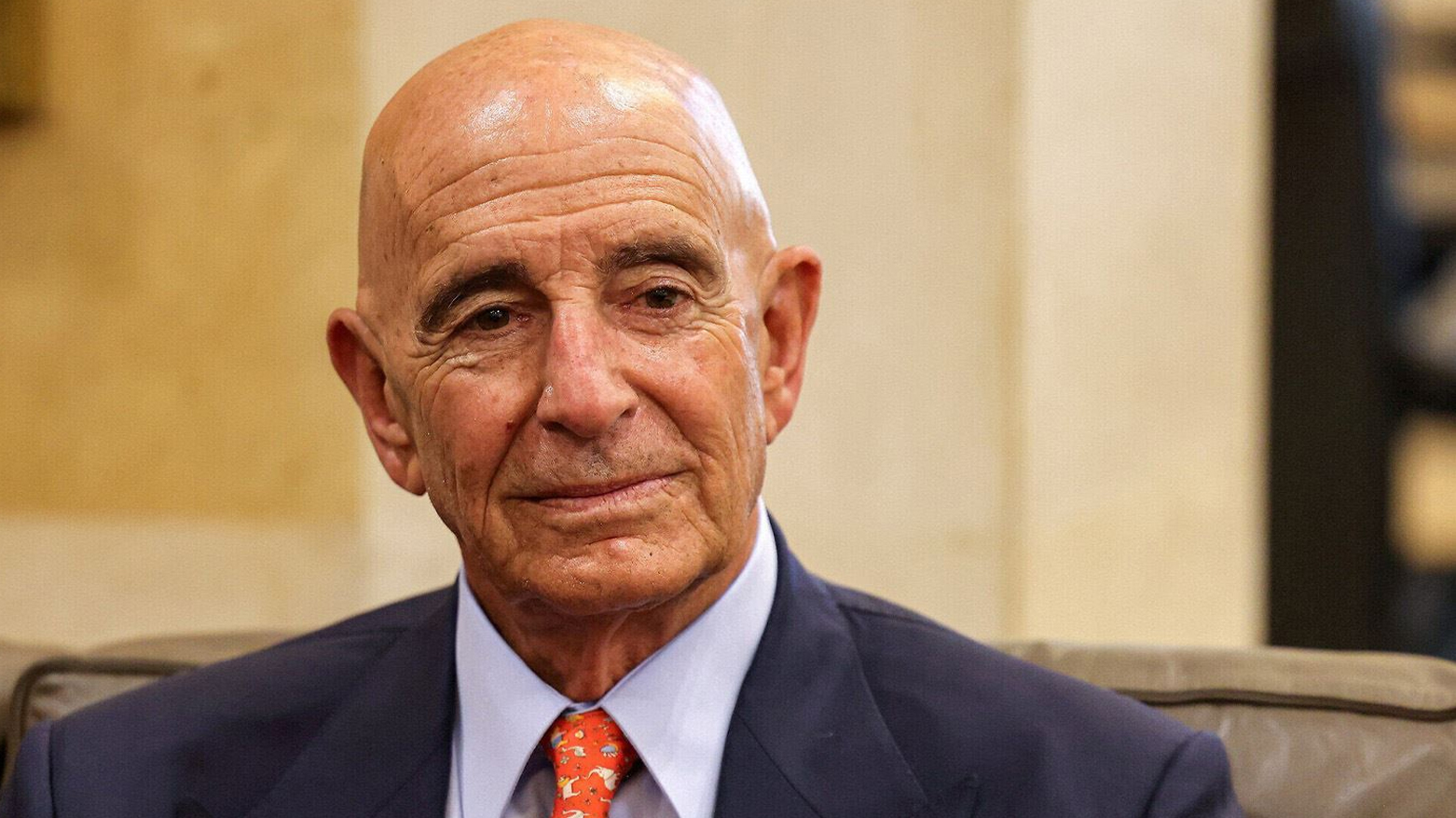Sykes-Picot Borders ‘Meaningless’ to Israel, Says U.S. Envoy Tom Barrack
“In Israel's mind these lines that were created by Sykes-Picot are meaningless,” Barrack stated definitively. “They will go where they want, when they want and do what they want to protect the Israelis and their border to make sure on October 7th it never happens again. Full stop there.”

ERBIL (Kurdistan24) – In a statement with profound implications for the future geopolitical landscape of the Middle East, U.S. Special Envoy for Syria, Ambassador Tom Barrack, has declared that in the view of the Israeli government, the historic borders established by the Sykes-Picot Agreement are now considered “meaningless.”
Speaking in a candid and wide-ranging interview with Mario Nawafal, the envoy explained that the Hamas attack on Oct. 7th fundamentally altered Israel's security doctrine, leading to a new reality where its forces will cross traditional lines to protect Israeli citizens, a sentiment that aligns with recent Israeli military actions in southern Lebanon, Syria, and Gaza.
Ambassador Barrack’s remarks provide an unvarnished American perspective on the seismic shifts underway in the region, suggesting a de facto redrawing of engagement rules that challenges a century of established international boundaries.
“In Israel's mind these lines that were created by Sykes-Picot are meaningless,” Barrack stated definitively. “They will go where they want, when they want and do what they want to protect the Israelis and their border to make sure on October 7th it never happens again. Full stop there.”
He stressed that the events of that day had completely changed the world for Israel, altering its perception of what constitutes its mandate and its borders.
These comments echo the actions of the Israeli military, which has established what it calls security zones in Gaza, southern Syria, and southern Lebanon, with Israeli officials stating their forces have no intention of withdrawing from key strategic positions.
While offering this stark assessment of Israeli policy, Barrack, an appointee and long-time friend of President Donald Trump, also revealed a surprisingly supportive and pragmatic U.S. stance towards Syria’s new president, Ahmed al-Sharaa.
Describing his own role as an “event-driven mercenary diplomat” rather than a traditional ambassador, Barrack expressed a striking level of confidence in the Syrian leader, whose past as a Sunni fundamentalist commander has been a point of major concern for the West.
“The answer is yes. I trust him. I believe him. I'm certain that his objectives today are aligned with our objectives,” Barrack affirmed, defining those shared goals as creating a new fabric of regional understanding and bringing Syria back to a path of prosperity and stability.
The U.S. envoy detailed the monumental challenges facing al-Sharaa, who he said walked into Damascus with a small team to take over from a 14-year regime, only to be confronted with a “plethora of problems.”
Barrack painted a grim picture of a nation on the brink of collapse, with a barter-based economy, limited water and power, a nonexistent banking system, and millions of refugees in neighboring countries waiting to return.
He noted the immense internal pressures from Syria’s diverse communities, stating, “the Druze are saying I want Druze land, the Kurds are saying I want Kurds land, the Alawites are saying I want Alawite land, and he's saying I want a centralized Syrian government.”
In this context, Barrack staunchly defended the Trump administration's policy, arguing there is “no plan B” for Syria and that a return to chaos would pose a greater counter-terrorism threat from groups like ISIS and Iranian proxies.
He explained President Trump’s decision to give al-Sharaa “a chance” was based on the hard-learned lesson that U.S.-led regime change, from Iraq to Libya, has consistently failed. “This President is saying no regime change, no more boots on the ground, we'll usher to help get this done, but you, the rest of the regional community, need to help,” Barrack said.
In his role as an “usher,” Barrack revealed that historic, direct talks have been arranged between Israeli and Syrian representatives in Paris, meetings he described as a major breakthrough after 30 years of no communication.
He recounted how, despite deep initial mistrust, the two sides engaged constructively, leading to a second meeting three weeks later that advanced the dialogue.
He characterized al-Sharaa as a pragmatist attempting to appease all his neighbors—from Israel and Turkey to the Gulf states—while being constrained by a fundamentalist base that makes any formal agreement like the Abraham Accords impossible for now.
Addressing long-held fears in the region, particularly in Lebanon and Syria, about a “Greater Israel,” Barrack dismissed the concern as “ludicrous” and a “zero” probability, especially in the post-Oct. 7th reality.
On the complex issue of Hezbollah, he offered a nuanced perspective, acknowledging it as a Lebanese political party that provides municipal services to its Shia constituency, while also identifying its military wing as a foreign terrorist organization funded by Iran.
He argued that the core issue is not simply disarming the group in a country where many are armed, but rather addressing the utilization of the weapons.
In a direct message to Lebanese factions who refuse to engage with Israel, Barrack was blunt: “Guys, get over it. It's Jurassic Park. You either talk to them today or you're going to talk to them in three years from now or five years from now. Dialogue is all that matters.”
This emphasis on dialogue, however difficult, appears to be the central pillar of his diplomatic strategy in a Middle East where old maps and old rules no longer seem to apply.
You can watch the full interview below.
🚨 EXCLUSIVE INTERVIEW: U.S. ENVOY REVEALS SECRET PEACE TALKS BETWEEN HEZBOLLAH, ISRAEL, SYRIA & LEBANON
— Mario Nawfal (@MarioNawfal) August 28, 2025
He just met with Netanyahu, Al-Sharaa, Aoun, and Berri – arguably the 4 most consequential figures currently shaping the Middle East conflict.
Hezbollah, Syria, Lebanon, and… https://t.co/qCMRNJPlVj pic.twitter.com/mbLa0l8lmU
